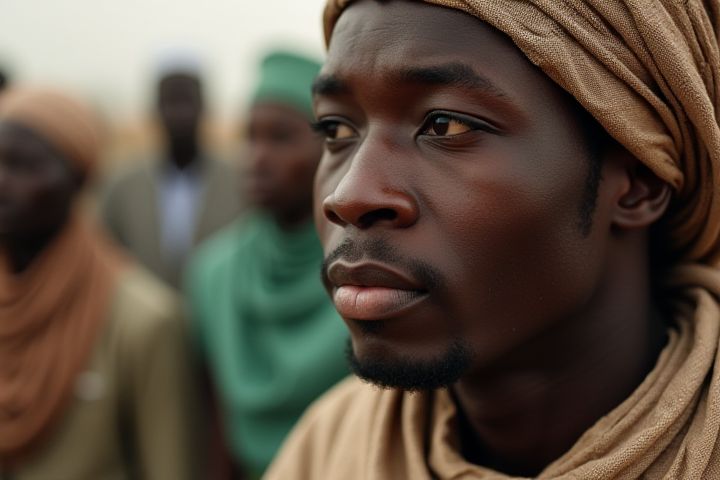
Nigeria is religiously diverse, with a significant population practicing both Christianity and Islam. The northern region predominantly adheres to Islam, while the southern part is mainly Christian, with a notable presence of traditional African religions. Nigeria is home to one of the largest Muslim populations in Africa, primarily of the Sunni denomination, while the Christian community includes various denominations such as Catholicism, Anglicanism, and Pentecostalism. The country's religious landscape is further influenced by tribal beliefs, cultural practices, and historical dynamics. Understanding this diversity is crucial for grasping the socio-political landscape of Nigeria.
Nigeria has both Christians and Muslims.
Nigeria is a culturally diverse nation with a significant population adhering to both Christianity and Islam. The northern regions predominantly practice Islam, while Christianity is mainly concentrated in the southern and central parts of the country. This religious diversity has shaped Nigeria's societal dynamics, influencing everything from politics to cultural festivals. Understanding this balance between the two faiths is essential for appreciating Nigeria's rich and complex heritage.
Roughly equal proportions of Christians and Muslims.
Nigeria has a diverse religious landscape, featuring roughly equal proportions of Christians and Muslims, with each group comprising around half of the nation's population. The southern region predominantly practices Christianity, while Islam is more prevalent in the northern areas. This balance between the two faiths plays a significant role in the country's socio-political dynamics, influencing governance and intercommunal relations. Understanding Nigeria's religious makeup is crucial for grasping its cultural complexity and the implications for societal cohesion.
Northern Nigeria predominantly Muslim.
Northern Nigeria is predominantly Muslim, with an estimated 80% of the population practicing Islam, particularly the Sunni branch. This region is known for its rich Islamic cultural history, characterized by ancient cities such as Kano and Sokoto, which serve as centers of Islamic learning and commerce. In contrast, Southern Nigeria has a significant Christian population, highlighting the religious diversity within the country. Understanding the dynamics of faith in Northern Nigeria is crucial for appreciating the region's sociopolitical landscape and cultural influences.
Southern Nigeria predominantly Christian.
Southern Nigeria is predominantly Christian, with a significant portion of the population adhering to various denominations, including Anglican, Pentecostal, and Catholic. Cities like Lagos and Port Harcourt reflect this Christian influence in their cultural practices, festive celebrations, and community events. Churches play a vital role in local communities, offering not just spiritual guidance but also social services and educational opportunities. Understanding the religious landscape of Nigeria reveals the distinct regional differences, with the south strongly showcasing a Christian identity amidst the nation's diverse beliefs.
Middle Belt has diverse religious practices.
Nigeria's Middle Belt region showcases a rich tapestry of religious diversity, predominantly characterized by both Christianity and Islam. This area serves as a cultural crossroads, where various ethnic groups practice their faith alongside unique local beliefs. Christianity is primarily practiced among ethnic groups such as the Berom and the Ngas, while Islam has a significant presence among the Hausa-Fulani population. You will find that inter-religious interactions and coexistence are common, reflecting the region's commitment to harmony despite underlying tensions.
Islam entered Nigeria through trade routes.
Islam entered Nigeria primarily through trade routes in the 11th century, facilitated by Muslim traders from North Africa and the Arabian Peninsula. These merchants established economic and cultural connections, which led to the gradual adoption of Islamic beliefs among various ethnic groups. The Hausa city-states in the north became significant centers for Islamic scholarship, influencing local governance and culture. Today, Nigeria has one of the largest Muslim populations in Africa, particularly in the northern regions, coexisting with a substantial Christian community in the southern areas.
Christianity spread with colonialism.
Christianity spread in Nigeria significantly during the colonial era, largely due to British missionary activities in the 19th century. With the establishment of colonial rule, missionaries aimed to convert indigenous populations, resulting in the establishment of schools, hospitals, and churches across the region. Notable denominations, such as the Anglican and Roman Catholic Churches, gained footholds in various areas, leading to a substantial increase in Christian adherents. Today, Nigeria boasts one of the largest Christian populations in Africa, reflecting the lasting impact of colonialism on its religious landscape.
Religious festivals widely celebrated.
Nigeria is a multi-religious nation, with significant populations of both Christians and Muslims, particularly prominent during their respective religious festivals. Christmas, celebrated on December 25th, is marked by vibrant church services, family gatherings, and community celebrations among Christians. Muslims widely observe Eid al-Fitr, which signifies the end of Ramadan, with prayers, feasting, and acts of charity, showcasing their deeply rooted traditions. In various regions, these festivals foster community spirit and cultural exchange, reflecting Nigeria's rich tapestry of religious diversity.
Interfaith relations can be tense.
Nigeria is home to a diverse population where both Christianity and Islam coexist, with nearly half of the population adhering to each faith. Interfaith relations can be tense, particularly in regions like the Middle Belt and Northern Nigeria, where religious affiliations often overlay sociopolitical divides. Tensions sometimes manifest in communal conflicts and violence, complicating the landscape for coexistence. Promoting dialogue and understanding between these religious groups is essential for fostering peace and stability in the nation.
Constitution allows freedom of religion.
Nigeria is a religiously diverse country, with Islam and Christianity being the two dominant faiths. The Nigerian Constitution explicitly guarantees freedom of religion, allowing individuals to practice any faith without oppression or discrimination. This constitutional provision supports a coexistence of various religious communities, fostering dialogue and tolerance among different beliefs. Despite underlying tensions, the commitment to religious freedom remains a cornerstone of Nigeria's democratic framework.
